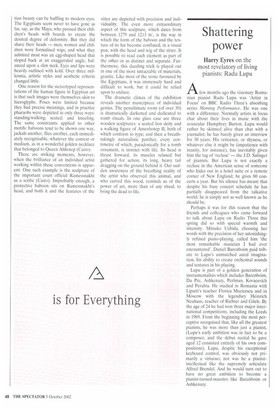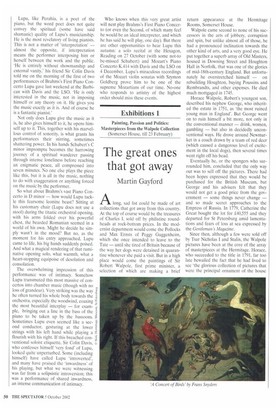Shattering power
Harry Eyres on the most revelatory of living pianists: Radu Lupu
Afew months ago the visionary Romanian pianist Radu Lupu was 'Artist in Focus' on BBC Radio Three's absorbing series Morning Performance. He was one with a difference. Normally artists in focus chat about their lives in music with the avuncular Humphrey Burton. Lupu would rather be skinned alive than chat with a journalist; he has barely given an interview for 30 years. His reticence, or shyness, or whatever else it might be (impatience with inanity, for instance), has inevitably given him the tag of 'recluse' — the J.D. Salinger of pianists. But Lupu is not exactly a recluse in the American sense of someone who hides out in a hotel suite or a remote corner of New England; he gives 80 concerts a year. But his silence has meant that despite his busy concert schedule he has partially disappeared from the talkative world; he is simply not as well known as he should be.
Perhaps it was for this reason that the friends and colleagues who came forward to talk about Lupu on Radio Three this spring did so with special warmth and intensity. Mitsuko Uchida, choosing her words with the precision of her astonishingly refined piano-playing, called him 'the most remarkable musician I had ever encountered'. Daniel Barenboim paid tribute to Lupu's unmatched aural imagination, his ability to create orchestral sounds and textures in his playing.
Lupu is part of a golden generation of instrumentalists which includes Barenboim, Du Pre, Ashkenazy, Perlman, Kmacevich and Perahia. He studied in Romania with Lipatti's teacher Florica Muzicescu and in Moscow with the legendary Heinrich Neuhaus, teacher of Richter and Gilels. By the age of 24 he had won three major international competitions, including the Leeds in 1969. From the beginning the most perceptive recognised that, like all the greatest pianists, he was more than just a pianist, (Lupu's early ambition was in fact to be a composer, and the debut recital he gave aged 12 consisted entirely of his own compositions). Lupu, despite his exceptional keyboard control, was obviously not primarily a virtuoso; nor was he a pianistintellectual like the supremely articulate Alfred Brendel. And he would turn out to have no great ambition to become a pianist-turned-maestro like Barenboim or Ashkenazy. Lupu, like Perahia, is a poet of the piano, but the word poet does not quite convey the spiritual (some have said shamanic) quality of Lupu's musicianship. He is the most revelatory of living pianists. This is not a matter of 'interpretation — almost the opposite, if interpretation means the performer interposing him or herself between the work and the public. 'He is entirely without showmanship and external vanity.' his friend Sir Colin Davis told me on the morning of the first of two performances of Brahms's First Piano Concerto Lupu gave last weekend at the Barbican with Davis and the LSO. 'He is only interested in the music, not in imposing himself or any theory on it. He gives you the music exactly as it is. And of course he is a fantastic pianist.'
Not only does Lupu give the music as it is, he also gives himself to it, he opens himself up to it. This, together with his marvellous control of sonority, is what grants his performances their stirring, sometimes shattering power. In his hands Schubert's C minor impromptu becomes the harrowing journey of a spiritual wanderer passing through intense loneliness before reaching an enigmatic peace, all compressed into seven minutes. No one else plays the piece like this, but it is all in the music, nothing to do with exaggeration or anything forced on the music by the performer.
So what about Brahms's vast Piano Concerto in D minor — how would Lupu tackle this fearsome leonine beast? Sitting at his customary chair (Lupu does not use a stool) during the titanic orchestral opening, with his arms folded over his powerful chest, the bearded Romanian seemed in a world of his own. Might he decide he simply wasn't in the mood? But no, as the moment for his entry approached, Lupu came to life, his big hands suddenly poised. And what a magical rendering of that ruminative opening solo, what warmth, what a heart-stopping equipoise of desolation and consolation.
The overwhelming impression of this performance was of intimacy. Somehow Lupu transmuted this most massive of concertos into chamber music (though with no loss of grandeur). Very striking was the way he often turned his whole body towards the orchestra, especially the woodwind, coaxing the most beautiful interplay — for example, bringing out a line in the bass of the piano to be taken up by the bassoons. Sometimes Lupu even seemed like a second conductor, gesturing at the lower strings with his left hand while playing a flourish with his right. If this breached conventional soloist etiquette, Sir Colin Davis, who confesses himself 'very fond' of Lupu, looked quite unperturbed. Some (including himself) have called Lupu 'introverted', and many have praised the 'inwardness' of his playing, but what we were witnessing was far from a solipsistic introversion; this was a performance of shared inwardness, an intense communication of intimacy.
Who knows when this very great artist will next play Brahms's First Piano Concerto (or even the Second, of which many feel he would be an ideal interpreter, and which he has said he will play, one day). But there are other opportunities to hear Lupu this autumn: a solo recital at the Hexagon, Reading on 27 October (with some not-to be-missed Schubert) and Mozart's Piano Concerto K.414 with Davis and the LSO on 4 December. Lupu's miraculous recordings of the Mozart violin sonatas with Szymon Goldberg prove him to be one of the supreme Mozartians of our time. No-one who responds to artistry of the highest order should miss these events.





































































 Previous page
Previous page